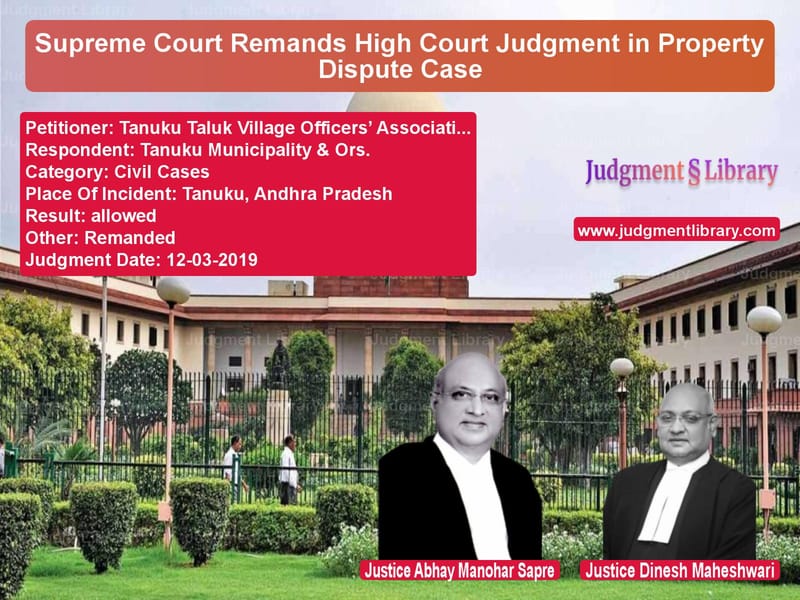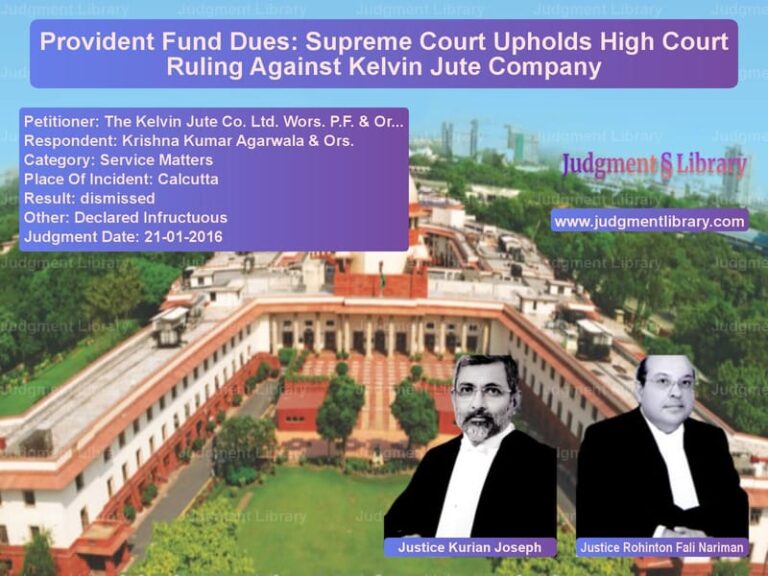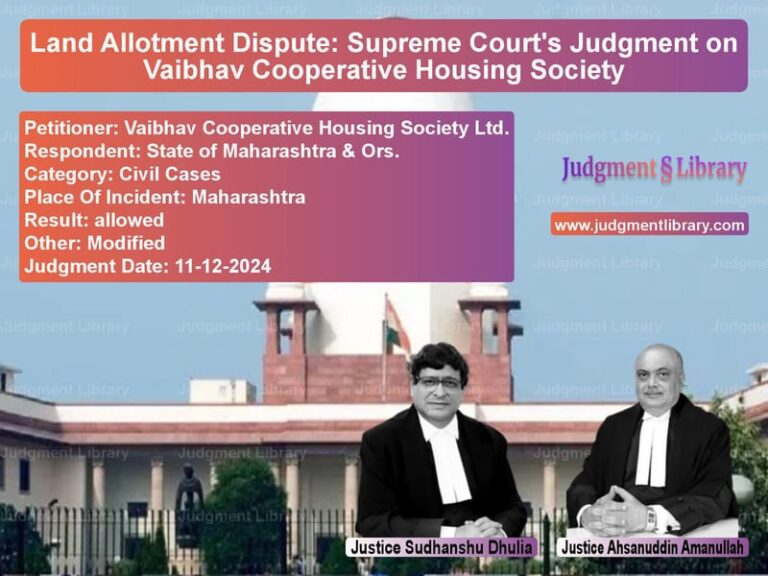Supreme Court Remands High Court Judgment in Property Dispute Case
The Supreme Court of India, in Tanuku Taluk Village Officers’ Association vs. Tanuku Municipality & Ors., addressed a significant legal issue concerning the procedural correctness of second appeals under Section 100 of the Civil Procedure Code (CPC). The Court ruled that the High Court of Andhra Pradesh erred in dismissing the appeals without addressing the substantial questions of law it had framed.
Background of the Case
The case originated from a property dispute between the appellant, Tanuku Taluk Village Officers’ Association, and the respondent, Tanuku Municipality. The appellant filed two civil suits:
- OS No. 384 of 1986: Seeking a permanent injunction against the respondent.
- OS No. 226 of 1987: Seeking recovery of arrears of rent.
Both suits were filed before the 1st Additional District Munsif, Tanuku. On August 14, 1996, the Munsif Court decreed in favor of the appellant.
Additionally, the appellant filed RCC No. 5 of 1987 before the Rent Controller (Principal District Munsif, Tanuku) for eviction of the respondent. On January 20, 1997, the Rent Controller ruled in favor of the appellant and directed the respondent to vacate the property.
Later, the appellant applied for the release of Rs. 42,400/- deposited by the respondent as rent. However, the Rent Controller rejected the application on May 14, 1997.
First Appellate Court’s Decision
The respondent challenged the Rent Controller’s order by filing CMA No. 8 of 1997 before the Senior Civil Judge, Tanuku. Simultaneously, the appellant challenged the rent deposit rejection through CMA No. 13 of 1997.
On January 21, 2004, the Senior Civil Judge allowed the respondent’s appeal and set aside the Rent Controller’s order while dismissing the appellant’s application for release of rent.
Similarly, the respondent appealed against the civil suit decrees through AS Nos. 69 & 70 of 1996 before the Senior Civil Judge, Tanuku. On January 21, 2004, the court ruled in favor of the respondent, reversing the Munsif Court’s decision.
Appeal Before the High Court
The appellant, aggrieved by the Senior Civil Judge’s orders, filed:
- Second Appeal Nos. 396 & 414 of 2004.
- Civil Revision Petitions (CRP) Nos. 2069 & 2073 of 2004.
The High Court admitted the appeals and framed the following substantial questions of law:
- Whether the lower appellate court was right in holding that the plaintiff society became defunct without any supporting evidence?
- Whether immovable property purchased by a registered society under a sale deed automatically vests with its tenant without a deed of conveyance?
- Whether a tenant, after admitting tenancy, can claim ownership of the property contrary to Section 116 of the Indian Evidence Act?
Despite framing these questions, the High Court dismissed the appeals on May 1, 2015, without answering them, instead ruling on a separate issue concerning suit maintainability.
Appeal Before the Supreme Court
The appellant challenged the High Court’s decision before the Supreme Court, arguing that:
- The High Court failed to decide the second appeals based on the substantial questions of law it had framed.
- The judgment was contrary to the requirements under Section 100 CPC, which mandates deciding second appeals based on framed legal questions.
- The High Court erred in dismissing the appeals based on a question it had not framed.
Arguments by the Respondents
The respondent argued that:
- The High Court’s finding that the suits were not maintainable was correct.
- The factual findings by the lower courts should not be disturbed at the second appellate stage.
- The Supreme Court should not interfere with the High Court’s judgment.
Supreme Court’s Observations
The Supreme Court carefully examined the procedural aspects of second appeals and made the following key observations:
- The High Court should have decided the appeals strictly based on the substantial questions of law framed under Section 100 CPC.
- If the High Court considered any additional questions necessary, it should have assigned reasons and framed them in accordance with Section 100(5) CPC.
- The High Court did not answer the framed questions but instead dismissed the appeals on a different legal ground.
- This procedural lapse made the judgment legally unsustainable.
The Court stated:
“The second appeal can be decided only on the question(s) framed under Section 100(4) of the Code of Civil Procedure. The High Court failed to adhere to this mandatory requirement.”
Final Judgment
The Supreme Court set aside the High Court’s judgment and remanded the case for fresh consideration. The key directives were:
- The High Court must rehear and decide the appeals and revision petitions strictly on merits.
- The High Court must answer the substantial questions of law framed at the admission stage.
- If additional questions are considered necessary, they must be framed with proper reasoning under Section 100(5) CPC.
The Court clarified:
“We have not expressed any opinion on the merits of the case. The High Court shall decide the second appeals uninfluenced by any observations made in the impugned order.”
Conclusion
This judgment reinforces the principle that second appeals must be adjudicated based on legally framed questions of law. It ensures that procedural lapses by appellate courts do not lead to injustice and reaffirms the necessity of strict adherence to Section 100 CPC.
Petitioner Name: Tanuku Taluk Village Officers’ Association.Respondent Name: Tanuku Municipality & Ors..Judgment By: Justice Abhay Manohar Sapre, Justice Dinesh Maheshwari.Place Of Incident: Tanuku, Andhra Pradesh.Judgment Date: 12-03-2019.
Don’t miss out on the full details! Download the complete judgment in PDF format below and gain valuable insights instantly!
Download Judgment: Tanuku Taluk Village vs Tanuku Municipality Supreme Court of India Judgment Dated 12-03-2019.pdf
Direct Downlaod Judgment: Direct downlaod this Judgment
See all petitions in Property Disputes
See all petitions in Landlord-Tenant Disputes
See all petitions in Judgment by Abhay Manohar Sapre
See all petitions in Judgment by Dinesh Maheshwari
See all petitions in allowed
See all petitions in Remanded
See all petitions in supreme court of India judgments March 2019
See all petitions in 2019 judgments
See all posts in Civil Cases Category
See all allowed petitions in Civil Cases Category
See all Dismissed petitions in Civil Cases Category
See all partially allowed petitions in Civil Cases Category







